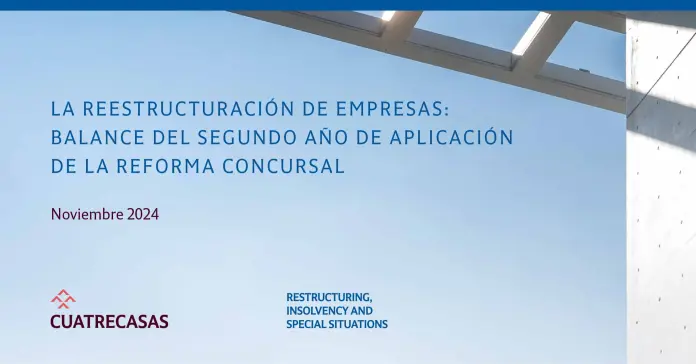Cuatrecasas publishes “Company restructuring: assessment of the second year of implementation of the insolvency reform,” continuing an initiative that was presented last year and in which it analyzes over 50 restructurings, focusing on the judicial decisions and selecting the most pertinent matters to further explore and understand this field.
The purpose of this document is to provide a comprehensive vision of the main trends and experiences in the implementation of Act 16/2022, of September 5, amending the consolidated text of the Insolvency Act. It will become an essential tool for specialists in restructuring, insolvency and special situations, while also contributing to the development of restructuring law in Spain. In short, this guide is part of the Cuatrecasas vocation to lead the restructuring market, and its firm intention to consolidate restructuring in our country as the optimum way to ensure the viability of companies in difficulty.
Technical evolution in practice area
The second year of implementation of the insolvency reform has shown significant technical development in the restructuring practice, becoming the preferred tool for market operators to achieve the viability of companies in difficulty. This year, there has been a greater variety and complexity of the cases, developing and clarifying issues that raised controversy in the first year, and ultimately, regulatory development accompanied by a significant sophistication of the restructuring market.
Main trends to highlight in restructuring
The guide shows some of the most important guidelines of pre-insolvency restructuring. It highlights the gradual increase—although still incipient—of the judicial review of requests for sanction without prior adversary proceedings, despite that Act 16/2022 advocates a principle of minimum judicial intervention, particularly when it comes to approval of restructuring plans.
Moreover, the recurring discussion over the correct formation of credit classes and the perimeter of claims has become the center of the challenges or objections of the disputed claims. Obviously, a lawsuit’s success for these reasons strengthens the incentive for the claim since it invalidates the restructuring plan. Constant litigation in this regard has brought up many interesting conclusions that the Cuatrecasas experts analyze in this guide.
Other noteworthy issues are the increase of the affected interim financing or new financing, and the unforeseen capacity of public law claims for the approval of restructuring plans.
The increased lack of consensus in promoting restructuring plans is highly significant.
Ignacio Buil, coordinating partner of the
Restructuring, Insolvency and Special Situations Practice, remarks: “The lack of regulation of a regime for competing plans, and the legal solutions in that regard, results in the players in the restructuring dashing to be the first to present the plan for approval, despite the absence of consensus.”
Debtors’ early applications and requests for sanction by minority creditors
The report shows that, despite the inclusion of “likelihood of insolvency” as objective grounds, restructuring plans are still predominantly triggered by imminent and current insolvency. Moreover, the cases of creditors’ requests for sanction without the debtor’s consent is symbolic so far.
Fedra Valencia, a partner from the same practice area, remarks: "On one hand, the Celsa precedent should have generated greater anticipation in promoting restructuring on the part of the debtors to avoid a loss of decision-making power; and on the other hand, an increase of applications by creditors without the debtor’s consent, with a change of corporate control as the key measure. None of these trends have been consolidated yet, although they should show a rise in the future.”
Marked increase in litigation
The report highlights an increase in litigation over restructuring plans, with numerous sanctions being challenged and restructuring plans being subject to prior adversary proceedings. The approval of restructuring plans is not always able to achieve a definitive solution, due to the principle of minimum judicial intervention, so the marked increase in litigation keeps the final solution on hold. The final judgments in this area confirm interpretation of the new regulation and a clear evolution toward the advancement of knowledge. However, the lack of a centralized judicial system enabling the establishment of case law has led to the inconsistent treatment of many matters, thus detracting from legal certainty in this regard.
